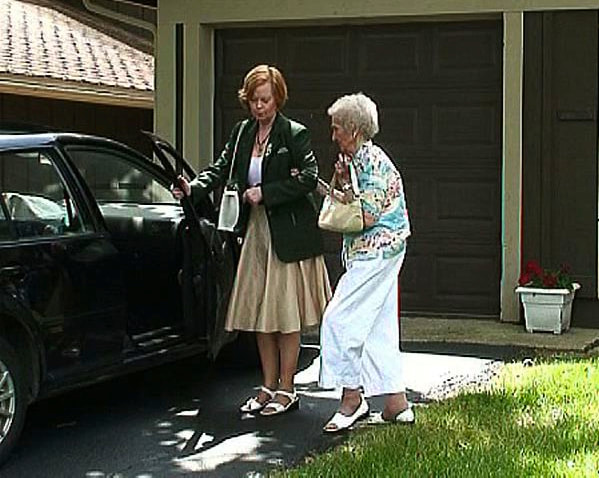|
My youngest sister had struggled with cancer since 2019. She passed away on January 28th 2022 @ 2:53pm.
Valentine’s Day was approaching but it was the last thing on my mind. I remembered that she had always sent me a Valentine; usually home made. She was the only member of my family who did. Many times I had told her she didn’t have to go to all that trouble but she did it anyway, year after year. This year would be different, there would be no Valentines. Then our doorbell rang and my husband answered. All I could do was hear their conversation. Our caller was a little neighbor girl. The sound of her small voice reminded me of my sister. She presented us with some cookies and her hand-painted card. “I thought you would like these;” she said. We had never received a Valentine gift from them before. My husband handed the bag to me. I ate a cookie and cried; it was just like my sister used to make. This gift was “ordered” from beyond and arrived at my lowest point: one final Valentine. Love is stronger than death. This event made me think about my work with caregivers. How does the process of caregiving’s end impact them? A caregiver, whose recipient dies, has a loss of role as well as a loss of a loved one. Society isn’t always helpful; “Why don’t you go out and celebrate your freedom?” [from caregiving] How would you respond when you’re in mourning? Some people inquire about the caregiver’s next career move; “Are you going to go get a job?” Many caregivers have had to give up promotions, to preserve their caregiving role. They re-enter the workforce with a financial deficit. Caregivers need to re-enter the workforce but how and where? What skills do they need now? Where are the new jobs? Thus, former caregivers face a more uncertainly-funded retirement. Wouldn’t you feel lost when you realized that work-life, and former friends have moved on? Do these conditions make a former caregiver want to celebrate; or to wonder where to turn? (!) Still, there is the ever-present grief. Some cultures weave that process into a ceremony. Ceremony helps in two ways, it commemorates and encapsulates. Commemoration seems obvious; like saying a prayer or lighting a candle. Encapsulation isn’t as obvious. Once the candle is lit or the prayer said; it’s done. Once a physical action expressed the emotions of the Caregiver its performance holds those feelings. Caregivers need to be honored and recognized for their loss as well their service. The emotion becomes action; as the action contains the emotion. Giving emotion a place and holding it, frees energy to devote to caregiver re-entry. Paid caregiving staff would benefit from recognition as well. I attended a funeral for an elder who had full-time care at home. The family, wisely, invited the former care staff to the funeral and the meal-of-condolence afterwards. Family members introduced the staff to various mourners. That’s not only kind; it’s necessary. Paid staff can become attached to their elders. “They also serve who only stand in wait”* (on the elder). Would our society attract better caregiving staff if they knew they would be recognized for their service? Transitions from caregiving require time, and money. That same family paid each staff member for two weeks in addition to their time at the funeral. Hooray! They need to find another job. How would one leap to a new job in 24 hours? Former family caregivers find their service is considered “time-off” by employers! Really! Managing elder care takes skill and coordination; valuable traits. Getting the elder to cooperate with care is an art; like that of negotiation. It’s time to see caregiving as a valuable experience. Family caregivers need the same things but there is no system for them. Military personnel, re-entering civil life, can get help with training, and support. These processes of loss, grief and rebuilding in caregivers goes unrecognized by society; leaving them isolated. As the GIs returned from WWII, there was the 52-40 club. Each person got $40.00 for 52 weeks. There is no such program for former caregivers. Why not? Oh NO! Such a program would cost money! Family caregivers usually serve for free. They SAVE over $10 billion dollars for our society. If we had to fund that care, our country would be in serious trouble. If we had a caregiver re-entry program it would be a WIN, WIN, WIN. First Win: We could incorporate already-existing social structure like churches, to incorporate caregiving recognition and support into their mission. Former caregivers could pass on their acquired wisdom to support new caregivers. Second Win: Money spent on education for former caregivers pays off in better wages earned and more tax revenue for society Third Win: Former caregivers, who are better able to recoup their lost earnings, would be less likely to require public assistance in their old age. A former caregiver re-entry program wouldn’t cost, it would pay. * A Tale of Two Cities, Charles Dickens
0 Comments
As we approach the holidays, we consider visiting elderly relatives or arranging for them to visit us. While I cannot offer a guarantee of a pleasant visit, here are a few things to keep in mind to avoid some of the pitfalls
HAPPY HOLIDAYS! When families gathered on Thanksgiving day, some realized that their senior was not the same as last year. Families often respond by doing internet research. The internet is a good first step. However, some sites make outlandish claims. I saw one that offered a treatment that “cured Alzheimer’s”. There is no cure and some of these sites can offer dangerous suggestions.
Here are a few reputable sites that offer reliable information: Alzheimer's Association. This site also has a page devoted to explaining the different types of dementia. It also lists other physical conditions or environmental conditions that can look like dementia. American Society on Aging. It can feel encyclopedic in size. The society has done decades of research and offers reliable information. It’s a good second step. AARP offers many programs and information for families as well as seniors. Each state has a chapter with offices in each area. Look up your state to find help in your area. And Senior Sidekicks offers a course; Preparing to Parent Your Parent, to prepare families for the practical issues they will face as they become caregivers. Contact us about teaching this course in your church or at your job. Call (217) 787-5866 or email us for more information. There it is: the street where you grew up and the house coming into view. All your memories flood back as you park the car and unload the bags. When you come inside, things aren’t the same. No decorations and no special smells or music greet you. Your parent is delighted to see you but that is as far as it goes.
Holidays reveal the way things are now. It takes extra effort to put up decorations and bake special dishes. Your parent may no longer be capable of doing the extras. How does that scene might make you feel? It is hard to view your family home which is now unfamiliar in its lack of holiday efforts. Perhaps, in your heart of hearts, you had a feeling things would be different this year. Perhaps, you even felt some physical symptoms as you reached the old neighborhood. Perhaps you felt irritable during this trip. The intuitive parts of us “record” small bytes of information from contacts with our parents earlier in the year. These impressions were stored away because the other parts of our lives are so busy. These bytes of impressions don’t go away because we grew up with these parents. We know them in depths we cannot put in words. Your feelings are your intuition comparing the way things were with the current data and flashing a signal to prepare you: heed that signal. Once you understand that these vague physical symptoms are signals they lose their power. You are not getting sick, but you may feel sick at heart. Feeling a sense of loss is real, so are feeling sad or lonely. Realizing things have changed is also real. Here we are at your parents’ doorway; what do we do with our feelings? The doorway is not the place to deal. Let’s go through the process and look for times and ways to handle your feelings. We have all had some nerve-wracking event and we all know how we reacted then. We are the same people now. Your feelings will hit you, plan for it. Take a moment for yourself when you feel symptoms or irritation. Yes, take a moment for yourself. You will not be able to cope with this process if you do not take yourself into account. If you are alone put your pen down, or take your fingers off the keyboard. Feel your feelings. That might include shedding a few tears, let them flow. It will work better than at your parent’s doorway. Perhaps you do not shed tears, punch something safe to punch! Take a few deep breaths. Next; reach for your positive memory. Select one or two things that were special to you about the holidays at home. Was it music? You know where the records are stored and you can retrieve them. Was a particular dish? If you can’t bake it, there are people who can. Order it for pick up. That pick up trip could be an outing for you to share with the parent or a chance to give you a break during the visit. Perhaps it’s decorating you remember. Think about those items and prioritize. Don’t get everything out. Putting up a couple decorations is another activity you can share with your parent. Resolve yourself to the new situation. This will not be a holiday like the past. You can make it a celebration: which is our presence with each other. That’s the greatest present. |
Author "A Senior Moment" is written by Ms. Sara Lieber, owner of Senior Sidekicks. Ms. Lieber has over 30 years of experience in senior care. Archives
March 2024
Categories
All
|





 RSS Feed
RSS Feed